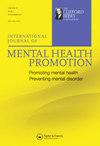女性青少年饮酒:家庭作为风险因素和保护因素
IF 1.4
4区 医学
Q4 PSYCHIATRY
International Journal of Mental Health Promotion
Pub Date : 2014-03-15
DOI:10.1080/14623730.2014.903607
引用次数: 1
摘要
青少年饮用酒精饮料被认为是一个严重的健康问题。此外,男孩和女孩之间过去消费模式的差异已经减少,这引起了人们对这种行为对女性青少年的影响的关注。由于家庭可以作为酒精使用的风险因素和保护因素,本研究的目的是了解家庭对女性青少年酒精使用的影响。该研究是定性的,并以探索性,描述性和横断面的方式进行。为了与青少年讨论这个话题,在巴西南部的一个城市进行了两个焦点小组,一个在私立学校,另一个在公立学校。之后,除了回答关于酒精使用的问卷和家庭支持感知量表外,参与者还被邀请参加个人访谈。这些小组总共由17名青少年组成,其中12名接受了采访。这些数据已提交专题内容分析。结果表明,参与研究的青少年与他们的家庭有相似的社交酒精使用模式。父亲比母亲更禁止女儿喝酒,而母亲则更宽容。在这个样本中,明确的饮酒规则、家庭支持和与女性形象的情感亲密是保护机制,证实了之前调查的数据。本文章由计算机程序翻译,如有差异,请以英文原文为准。
Alcohol consumption by female teenagers: the family as a risk and a protection factor
Alcoholic beverage consumption during adolescence is considered as a serious health problem. Moreover, the differences in the past consumption pattern between boys and girls have decreased, which draws attention to the effects of such behavior in female adolescents. Because family can act as both risk and protective factors for the use of alcohol, the objective of this study was to comprehend the family influence on alcohol use among female adolescents. The research is qualitative and it was performed in an exploratory, descriptive and cross-sectional way. Two focus groups were conducted, one in a private school and another in a public one, both in a city in Southern Brazil, in order to discuss the topic with the adolescents. Afterwards, the participants were invited to attend an individual interview, in addition to answering a questionnaire on alcohol use and the Family Support Perception Inventory. In total, the groups consisted of 17 adolescents, from which 12 were interviewed. The data was submitted to thematic content analysis. The results indicated that the participating adolescents had a pattern of social alcohol use similar to their families. Fathers were more prohibitive to their daughters drinking than mothers, who were more permissive. For this sample, clear rules for drinking, family support and emotional closeness with female figures served as protection mechanisms, corroborating data from previous surveys.
求助全文
通过发布文献求助,成功后即可免费获取论文全文。
去求助
来源期刊
CiteScore
1.70
自引率
7.70%
发文量
52
期刊介绍:
This title has ceased (2018). The first journal of its kind in the field, IJMHP publishes materials of distinction, making it essential reading for those with a professional or personal interest in mental health promotion. IJMHP co-ordinates the dissemination of new research outcomes to all those involved in policy making and the implementation of mental health promotion and mental disorder prevention policies. This makes it indispensable to clinical/medical staff, health services researchers, managers, health promoters, educationalists, sociologists, health economists and practitioners from all branches of health and social care, publishing materials by and for all these communities. IJMHP is an official publication of the Clifford Beers Foundation, who work to promote mental health and prevent mental disorders through dissemination of knowledge, training partnerships and consultation. The journal is peer reviewed by an expert international board and acts as a comprehensive information resource designed to increase awareness, foster understanding and promote collaboration between the different disciplines engaged in this diverse activity of study.

 求助内容:
求助内容: 应助结果提醒方式:
应助结果提醒方式:


